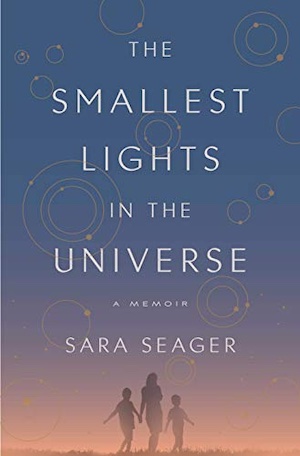By Jay M. Pasachoff
I don’t know how to characterize this remarkable book, except to say that it is beautifully written; tells a fantastic story about people, humanity, and the search for life in the Universe; and that I am glad to have read it. As they say: you can’t make this stuff up.
My wife and I knew Mike Wevrick, her late husband, first—he had been my editor for a junior-high text. And I knew that this editor had a wife who was an astrophysicist—but I had little idea of her brilliance or status. Once, minor illness prevented me from speaking at a non-technical meeting in Washington, D.C., and I asked Sara Seager to fill in for me; probably she had already been on the program. So I knew basically what Sara Seager, with an MIT astrophysics professorship, was working on. But her originality and depth of thought was something I came to appreciate by reading her memoir.
The book is painful to read, since Mike died young (of cancer)—leaving Sara with two young children. We learn about the Widows of Concord (Mass.), a club of about a half dozen young widows to which nobody yearns to belong. Yet, Sara as author tells the personal story in such detail as to bring us into her ken.
As for the sky—with no limit—Seager’s efforts on some space projects to find signs of life on some of the thousands of exoplanets (planets around stars other than our Sun) fill perhaps half the book with science-related details. Among many other things, she has thought scientifically about what signs of life we would accept in the spectra of an exoplanet atmosphere. Oxygen, for example, could be formed naturally without life breathing it in or out—so we shouldn’t accept that there is life on, say, Trappist 1b just if we should detect oxygen’s spectral lines in its atmosphere. But what if we find a type of chlorofluorocarbon that in my house exists only in my air conditioner? Then we can be confident that life has been found hundreds or thousands of light years away from us.
I am a skeptic of the effort being placed on the search for life; just finding these very-different planets from our own, or finding pulsars or merging black holes is exciting enough for me. I worry that the search for life being highlighted for Perseverance now on Mars is distorting our scientific goals. And I worry that too much effort in searching for life could lead to a come-down when it isn’t found after some more years and decades of searching—though people like Seager seem to think that we’ll find it.
We read about support Seager has received, both professional and personal in the best mentorship fashion, from top scientists like John Bahcall at the Institute for Advanced Study and Bob Williams at the Space Telescope Science Institute.
I am not used to reading personal memoirs, and the highs and lows we read about in the book are a story that is exceptionally well told, with language that sometimes soars.
I’m glad to have read this personal story, and I think you will be glad, too.
Astronomer and author Jay M. Pasachoff (ΦBK, Williams College) is the director of the Hopkins Observatory and Field Memorial Professor of Astronomy at Williams College. He is a visitor in the Carnegie Observatories. Williams College is home to the Gamma of Massachusetts chapter of Phi Beta Kappa.




